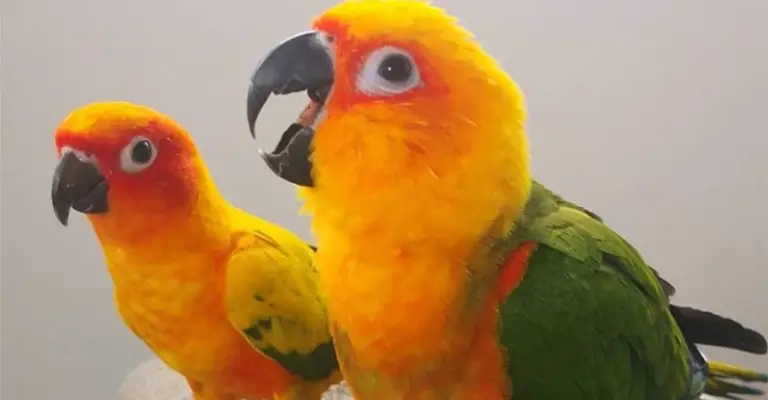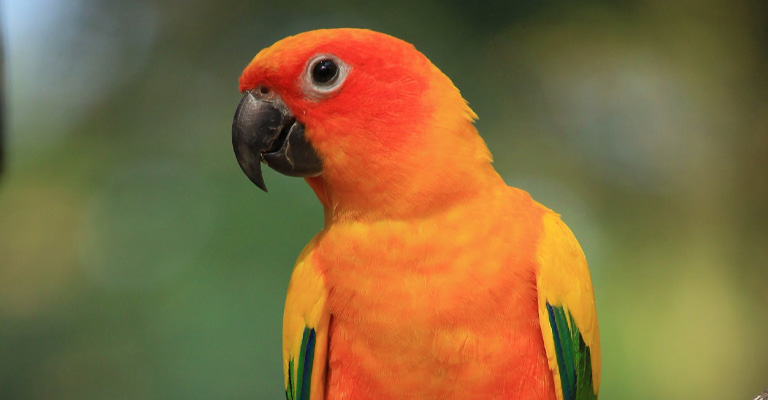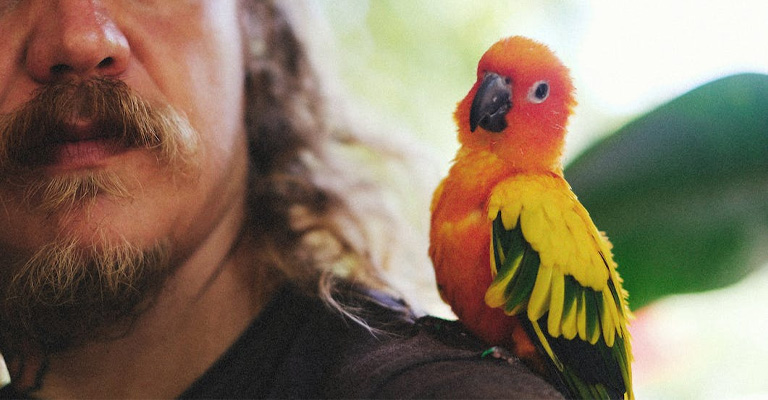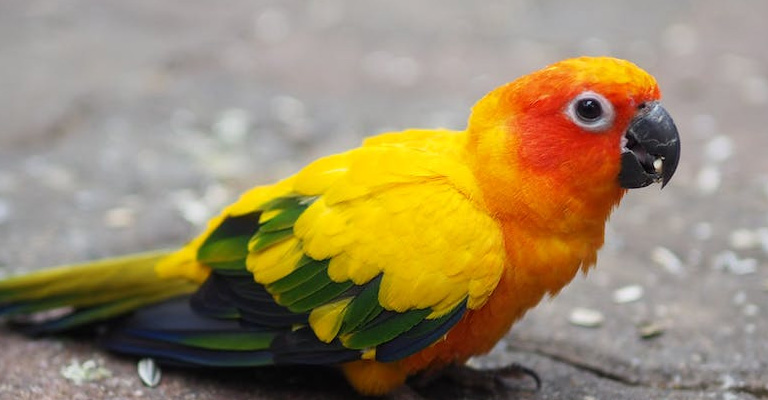Sun conures (Aratinga solstitialis) are dazzling and vibrant parrots renowned for their stunning plumage and lively personalities. These captivating birds are cherished companions for many avian enthusiasts.
However, one characteristic that can sometimes prove challenging for their owners is their tendency to scream. In this article, we will explore why do Sun Conures scream and shed light on how to manage and mitigate their screaming behaviors.

Why Do Sun Conures Scream?
Here are the reasons why Sun Conures often scream:
Natural Communication
Vocalization is an inherent part of a sun conure’s nature. In their natural habitat, these social birds communicate through various vocal expressions to maintain contact with their flock, convey information about their environment, and establish territory boundaries.
By imitating these behaviors, sun conures often scream to express themselves and engage with their human counterparts. It is essential to recognize that their vocalizations serve a purpose and are not meant to be deliberately disruptive or annoying.
Emotional Expression
Sun conures are highly intelligent and emotionally sensitive creatures. Similar to humans, they experience a wide range of emotions such as happiness, excitement, fear, and frustration.
Sudden loud noises, unfamiliar surroundings, lack of mental stimulation, or feeling neglected can trigger their vocalizations. Screaming may be their way of expressing their emotions or seeking attention and reassurance from their owners.
Environmental Factors
The environment in which sun conures are kept plays a significant role in their vocalization patterns. These birds are naturally active and require mental and physical stimulation to stay happy and healthy.
If they are confined to a small cage, lack social interaction, or have limited access to toys and activities, they may resort to screaming as a means of alleviating boredom or expressing frustration.
Creating an enriching environment with plenty of toys, perches, and social interaction can help reduce excessive vocalization.
Mimicking Behavior
Sun conures possess remarkable mimicry skills. They can imitate various sounds, including household noises, phone rings, doorbells, and even their owner’s voice.
If they observe their owners responding to loud noises or calling out for attention, they may learn to mimic these sounds to engage in a similar interaction.
Attention-seeking
Sun conures are highly social creatures that crave companionship and interaction. If they feel neglected or desire attention from their owners, they may resort to screaming to grab their attention.
Reinforcing positive behaviors and spending quality time with your sun conure can help alleviate their need for attention and minimize excessive vocalization.
How to Stop Sun Conure from Screaming?

Understanding the reasons behind sun conures’ screaming behavior is crucial in finding effective solutions. Here are some strategies to manage their vocalization patterns:
Environmental Enrichment
Provide a spacious cage, plenty of toys, and regular out-of-cage time for exercise and exploration. Introducing new toys and rotating them regularly can help prevent boredom and encourage mental stimulation.
Positive Reinforcement
Reward desired behaviors, such as calmness and quieter vocalizations, with treats, praise, or attention. Ignore excessive screaming to avoid unintentionally reinforcing it.
Consistent Routine
Establish a consistent daily routine for your sun conure, including feeding, playtime, and social interaction. Predictability can provide them with a sense of security and reduce anxiety-induced vocalizations.
Training and Socialization
Engage in training sessions with your sun conure to teach them basic commands and desirable behaviors. Additionally, ensure regular social interaction and playtime to fulfill their social needs.
Seek Professional Guidance
If the screaming behavior persists despite your efforts, consider consulting an avian veterinarian or an experienced avian behaviorist who can provide specialized advice and guidance.
How Do You Train a Conure Not to Scream?

Training a conure not to scream can be a gradual process that requires patience and consistency. Here are some steps you can take to help reduce excessive screaming:
Identify the Triggers
Pay attention to the situations or stimuli that tend to provoke your conure’s screaming. It could be certain noises, specific people, or being left alone. By identifying these triggers, you can work on gradually desensitizing your conure to them.
Use Positive Reinforcement
Reward your conure when they are quiet or exhibit desired behaviors. Offer verbal praise, treats, or a favorite toy whenever they remain calm instead of screaming. This helps them associate being quiet with positive outcomes.
Teach the “Quiet” Command
Start by teaching your conure a specific command or cue, such as “quiet” or “no screaming.” Whenever your conure starts screaming, calmly say the command and wait for a moment of quiet.
As soon as they pause, reward them with praise and treats. Repeat this process consistently, gradually increasing the duration of quiet before rewarding.
Ignore the Screaming
If your conure starts screaming for attention, avoid giving them any response or attention. Even negative attention, like yelling or scolding, can reinforce the behavior. Wait until they quiet down, and then give them attention or engage in playtime.
Create a Distraction
When your conure begins to scream, try redirecting their attention to a different activity or toy. Offer a puzzle toy, a foraging opportunity, or engage them in a game that requires mental and physical stimulation. This helps divert their focus away from screaming.
Provide Adequate Stimulation
Make sure your conure receives sufficient mental and physical stimulation throughout the day. Offer a variety of toys, rotate them regularly, and engage in interactive play sessions.
Enriching their environment and providing opportunities for exercise and exploration can help reduce boredom and excessive screaming.
Consistency and Routine
Establish a consistent daily routine for your conure. Maintain regular feeding times, playtime, and social interaction. Consistency helps create a sense of security and predictability for your bird, reducing anxiety and potential triggers for screaming.
Remember that training takes time and patience. Consistency, positive reinforcement, and a calm approach are key. Be aware that conures are naturally vocal birds, and completely eliminating all vocalizations may not be realistic.
The goal is to reduce excessive screaming and establish better communication and behavior patterns.
Are Sun Conures Loud?

Yes, Sun Conures are known for being loud birds. They have a naturally loud call, and they can become particularly vocal during the morning and evening hours.
If you’re considering getting a Sun Conure or already have one and are looking for ways to handle their noise, here are a few tips:
Accept Their Nature
Sun Conures are naturally loud birds, and their vocalizations are a way for them to communicate and express themselves. It’s important to understand and accept this aspect of their behavior.
Provide Mental and Physical Stimulation
Sun Conures can become louder if they are bored or under-stimulated. Make sure to provide them with plenty of toys, puzzles, and activities to keep them mentally and physically engaged. This can help redirect their energy and reduce excessive noise.
Maintain a Routine
Establish a consistent daily routine for your Sun Conure. This includes regular feeding times, playtime, and social interaction. Having a predictable routine can help reduce anxiety and excessive vocalization.
Positive Reinforcement
When your Sun Conure is quiet or exhibits desired behavior, reward them with praise and treats. Positive reinforcement can help reinforce the behaviors you want to encourage while minimizing excessive noise.
Environmental Considerations
Create a comfortable and stimulating environment for your Sun Conure. Provide a spacious cage with toys, perches, and interesting objects. Ensure that their cage is placed in an area where they can see and interact with family members, as birds are social creatures and thrive on social interaction.
Training and Socialization
Consider training your Sun Conure to understand basic commands or tricks. This not only provides mental stimulation but also helps establish a bond between you and your bird.
Additionally, socialize your Sun Conure with different people and situations from an early age, as this can help reduce anxiety and excessive vocalizations.
Seek Professional Advice
If your Sun Conure’s noise level becomes a persistent issue or if you have concerns about their behavior, consult with an avian veterinarian or a professional bird behaviorist.
They can provide personalized advice and guidance based on your specific situation.
Remember, it’s essential to be patient and understanding with your Sun Conure. They are intelligent and social birds that require love, attention, and mental stimulation to thrive.
With time, consistency, and proper care, you can help manage their vocalizations and develop a rewarding relationship with your feathered friend.
Can I Punish My Sun Conure for Screaming?
Punishing a Sun Conure for screaming is not recommended as a primary approach. Birds, including Sun Conures, do not respond well to punishment, and it can potentially have negative consequences on their well-being and the trust they have in you as their caregiver.
Instead of punishing your Sun Conure, it’s more effective to focus on positive reinforcement and providing appropriate outlets for their natural behaviors. Here are some alternative strategies to consider:
Ignore the Screaming
When your Sun Conure starts screaming for attention, avoid responding or giving any attention. If you give attention even in a negative way, it can reinforce the behavior.
Wait for a moment of quiet or engage with them when they are calm. This helps teach them that being quiet leads to positive interaction.
Provide Enrichment
Ensure your Sun Conure has a stimulating and enriched environment with plenty of toys, perches, and activities to keep them mentally and physically engaged. This can help reduce boredom and provide alternative outlets for their energy.
Reward Desired Behavior
Whenever your Sun Conure is quiet or exhibits desired behaviors, such as playing calmly or engaging in other activities, offer verbal praise, treats, or a favorite toy as positive reinforcement.
This helps them associate being quiet with positive outcomes.
Teach Alternative Behaviors
Consider training your Sun Conure to learn specific commands or tricks, such as stepping up, target training, or performing simple actions. This provides mental stimulation, strengthens the bond between you and your bird, and redirects their focus away from excessive screaming.
Identify and Address Triggers
Pay attention to the situations or stimuli that tend to provoke your Sun Conure’s screaming. It could be certain noises, specific activities, or changes in their environment.
Once you identify the triggers, try to minimize or gradually desensitize your bird to them.
Seek Professional Advice
If your Sun Conure’s screaming persists despite your efforts, consider consulting with an avian veterinarian or a professional bird behaviorist. They can provide personalized advice and guidance based on your specific situation and help address any underlying issues.
FAQs
While it may not be possible to completely eliminate a sun conure’s screaming behavior, it is possible to manage and reduce it significantly through training, environmental enrichment, and positive reinforcement.
Sun conures are highly active and intelligent birds, so providing them with a variety of toys that encourage mental stimulation and physical exercise can be beneficial.
Toys that require problem-solving, such as foraging toys or puzzle toys, can distract them from screaming and redirect their energy towards a more productive activity.
Punishing a sun conure for screaming is generally not recommended. It can create fear and anxiety, further exacerbating the problem. Punishment may also lead to aggression or other undesirable behaviors.
The time it takes to see a reduction in a sun conure’s screaming can vary depending on various factors, such as the bird’s individual temperament, the consistency of training and environmental changes, and the underlying reasons behind the screaming behavior..
Introducing a compatible companion for your sun conure can be an effective strategy to reduce excessive screaming, as it provides social interaction and companionship.
However, it is important to ensure a proper introduction and monitor their interactions closely to ensure they get along well.
Bottom Line
That was all about why do sun conures scream. Sun conures’ vocalizations are a natural expression of their emotions, communication, and desire for social interaction.
Understanding the underlying causes of their screaming behavior can help bird owners manage and address it effectively.
By providing a stimulating environment, reinforcing positive behaviors, and offering companionship, sun conures can lead a fulfilling and harmonious life alongside their human companions.